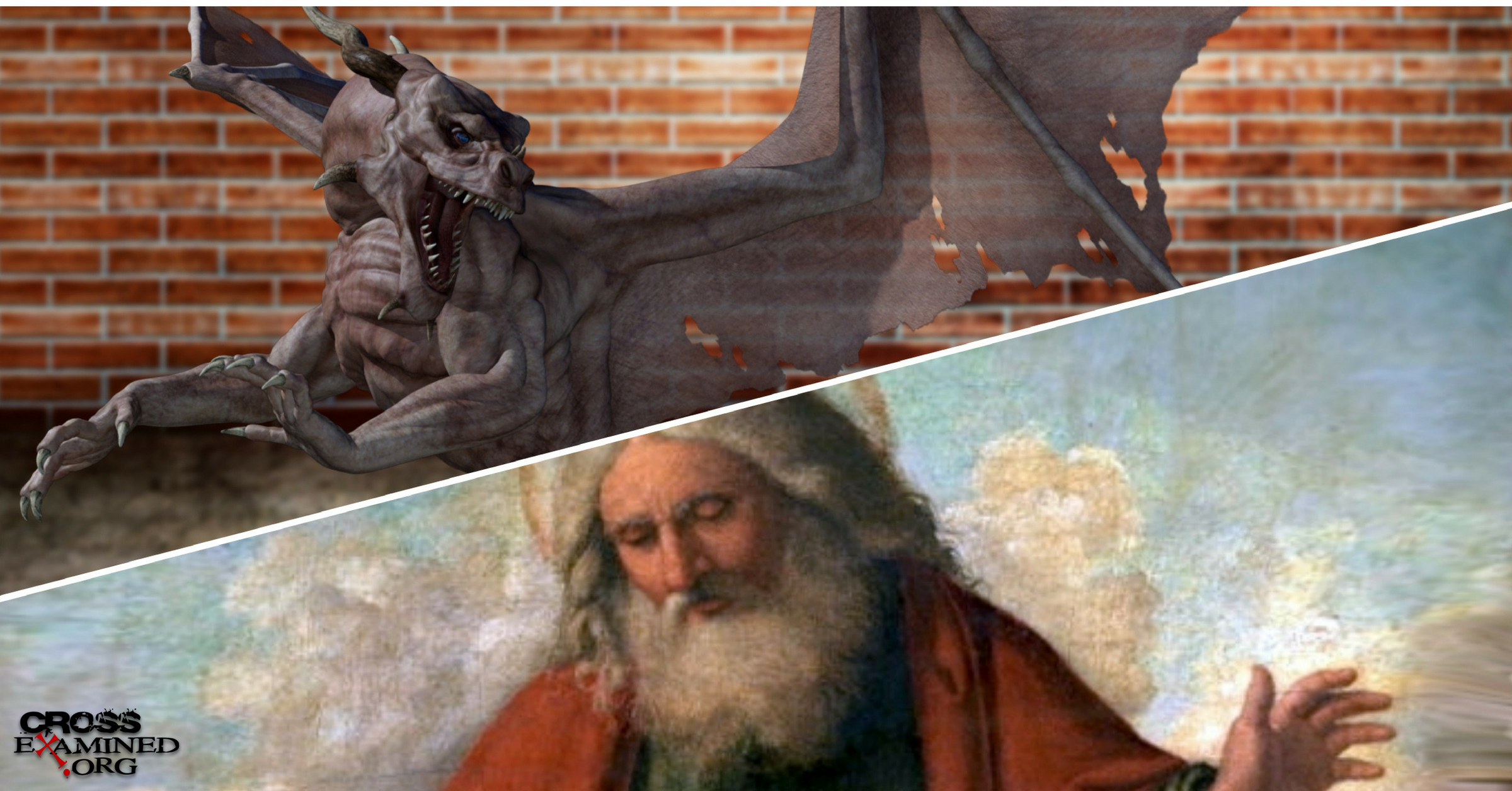In the recent debate between Frank Turek and Michael Shermer, the latter tried to invalidate Frank’s God hypothesis as an explanation for some facts about reality by using the famous “dragon in the garage” analogy, first used by Carl Sagan in his book The Demon-Haunted World .
This is the original analogy:
“There is a fire-breathing dragon living in my garage.” Suppose I were to make a statement like that to you. Perhaps you would like to test it out, see for yourself. There have been countless stories of dragons over the centuries, but no real evidence. What an opportunity!
—Show me —you say.
I take you to my garage. You look in and see a ladder, empty paint cans, and an old tricycle, but the dragon is gone.
—Where is the dragon? —he asks me.
“Oh, it’s here,” I reply, waving my hand vaguely. “I forgot to mention that it’s an invisible dragon.”
He suggests that I cover the garage floor with flour so that the dragon’s footprints remain.
“Good idea,” I reply, “but this dragon is floating in the air.”
He then proposes using an infrared sensor to detect invisible fire.
—Good idea, but invisible fire doesn’t give off heat either.
Suggests spray painting the dragon to make it visible.
—Good idea, except it’s a disembodied dragon and the paint wouldn’t stick to it.
And so on. I counter any physical proof you propose to me with a special explanation of why it won’t work. Now, what is the difference between an invisible, disembodied, floating dragon that breathes fire that doesn’t burn and a nonexistent dragon? If there is no way to disprove my claim, if there is no conceivable valid experiment against it, what does it mean to say that my dragon exists? Your inability to invalidate my hypothesis is not at all equivalent to proving it true. Claims that cannot be proven, assertions that are immune to refutation, are truly worthless, no matter how much value they may have in inspiring us or exciting our sense of wonder. What I have asked you to do is to end up accepting, in the absence of proof, what I say.
Shermer’s version has a few variations to ridicule Frank’s position of the existence of God as an explanation for the origin of the universe, objective moral values and duties, and the fine-tuning of the universe. Shermer’s main aim is to show that the existence of God is impossible to disprove in the same way that you cannot disprove the existence of the dragon in the garage. But is this a good argument? Not really. Let me explain why.
The first thing Shermer would have us believe by using Sagan’s analogy is that the attributes of God that theists attribute to him are mere gratuitous assertions without any evidence. Here Shermer has in mind revealed theology, those attributes that we know God possesses through his revealed word to us, the Bible. But in the debate with Frank—and in non-presuppositional apologetics in general—one does not assert God’s attributes as in the case of the garage dragon. And although it is not necessary, let me compare the garage dragon and God with respect to their respective attributes.
Garage Dragon
Invisibility. This attribute is granted without any evidence.
Levitation. It is also not inferred based on any evidence.
Cold Fire. Like the previous ones, there is no argument to attribute this property to the dragon, moreover, the property is self-contradictory.
Immateriality. Zero arguments, and like cold fire, this is a contradictory property with a dragon. In order for a dragon to be a dragon, it must have a body with certain essential characteristics of a dragon, it cannot be incorporeal.
God
Creator, metaphysically necessary, self-existent. These attributes are inferred by means of the argument from contingent beings and by the ontological argument.
Transcendent cause, personal, beginningless, uncaused, timeless, spatially boundless, immaterial, personal, supremely powerful. These attributes are required by the nature of a cause transcending the universe and are inferred by the kalam cosmological argument.
Designer and highly intelligent. These attributes are inferred by the fine-tuning argument of the universe.
Perfectly good, whose nature is the standard of goodness and whose commands constitute our moral duties. And this last attribute is concluded by means of the moral argument.
As we can see, the garage dragon is completely deficient compared to God.
Shermer also calls the God hypothesis a special pleading fallacy, but we have seen from this comparison that this is not the case. No serious apologist in a debate sets out to counter objections to arguments for existence by claiming that the atheist does not have the capacity to understand the properties of God as the best explanation for some facts of reality.
Another important point is that Shermer also uses the garage dragon as a parody of God as an explanation for the following facts about reality: the absolute origin of the universe, fine-tuning, and the foundation for objective moral values and duties. But his parody fails miserably for two reasons: the first is, as we have already seen, that some of the attributes that the garage dragon possesses are self-contradictory, which is more than enough reason to determine that such a dragon is impossible to exist. Then, for the sake of argument, I am going to be very kind in modifying the dragon by removing all of its contradictory properties and adding the property of omnipotence. Can the dragon be the transcendent cause of the origin of the universe when it has enough power to bring the universe into existence? No way! An essential property of the dragon is that it has to be material, corporeal, without that property it would cease to be a dragon. But if our version of the omnipotent dragon is corporeal, if it is a physical being, then it cannot be the cause of the origin of the universe, because one of the characteristics that a transcendent cause must have is to be immaterial; it cannot be material because matter comes into existence with the origin of the universe. The same goes for being the foundation of objective moral values and duties; our dragon cannot be eternal; it had to come into existence together with the universe, therefore, it is contingent, and no contingent being can be the foundation for objective morality.
Conclusion
We have seen that the garage dragon analogy as presented by Michael Shermer as an argument against the God hypothesis is flawed for four reasons:
- Due to the contradictory attributes that the garage dragon possesses, we can affirm that its existence is impossible.
- God’s attributes are inferred by deductive arguments, which is not the case with the dragon in the garage.
- Defending the attributes of the garage dragon is indeed committing the fallacy of special pleading, but not in the case of God.
- The garage dragon as a parody of God to be the transcendent cause of the universe and the foundation for objective morality fails miserably because it is a contingent being (and that grants it a possible existence if we remove its contradictory properties).
Jairo Izquierdo Hernandez is the founder of Christian Philosopher . He currently works as Social Media Director and author for the Christian organization Cross Examined . He is a member of the Christian Apologetics Alliance, studies philosophy, and is a worship minister at the Christian Baptist church Christ is the Answer in Puebla, Mexico.











